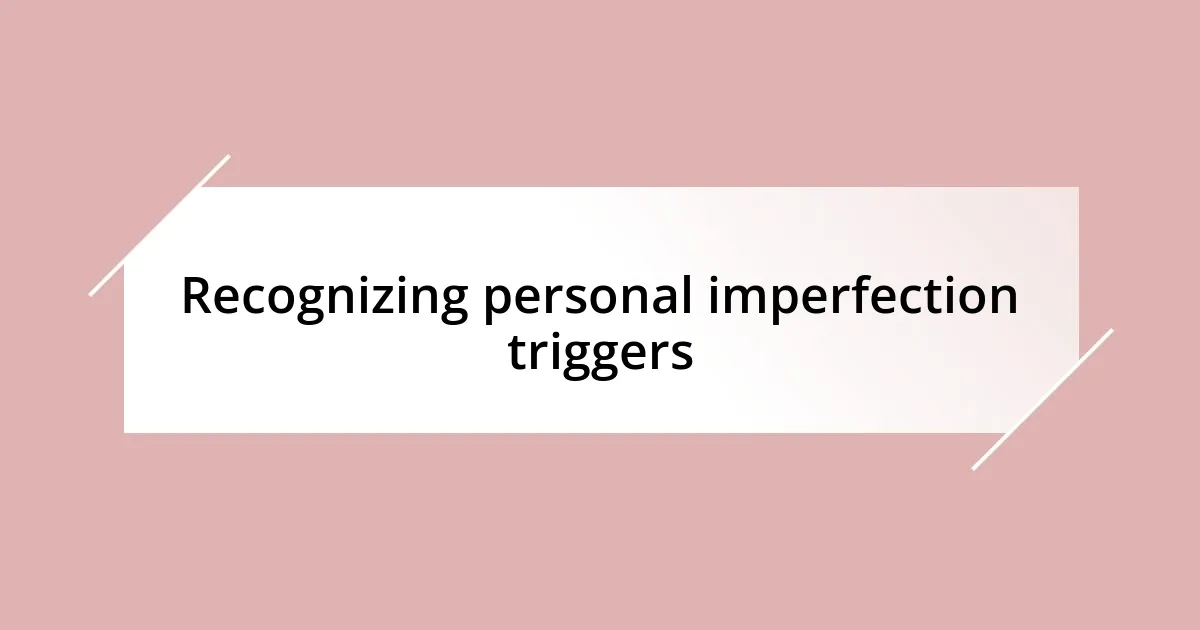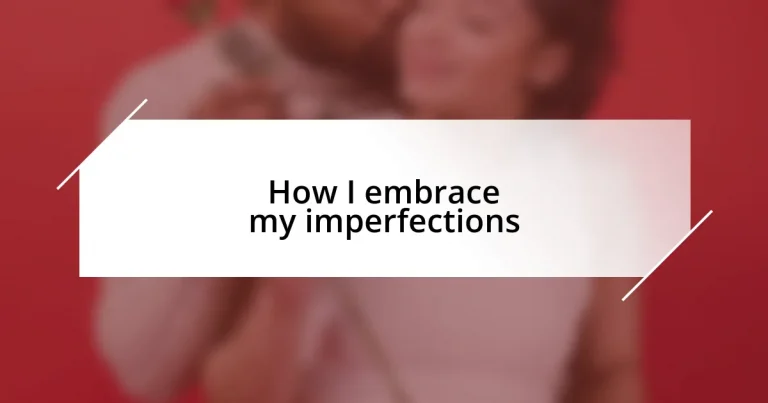Key takeaways:
- Embracing imperfections enables personal growth and deeper connections by sharing vulnerabilities.
- Recognizing triggers for feelings of inadequacy helps in navigating emotions and practicing self-acceptance.
- Shifting from self-criticism to celebrating small victories fosters resilience and improves self-esteem.
- Practicing vulnerability in relationships strengthens bonds and facilitates authentic connections.

Understanding the concept of imperfections
Imperfections are an intrinsic part of being human. I vividly remember a time when I struggled with my smile, feeling self-conscious about a gap between my teeth. At first, it felt like a flaw, but over time, I realized it was a unique feature that stood out—almost like a badge of authenticity. Isn’t it fascinating how something we perceive as a defect can actually tell a story about who we are?
When I think about imperfections, I also see them as opportunities for growth. There were moments in my life, like when I missed an important deadline, that left me questioning my abilities and worth. Yet, those experiences shaped my resilience and taught me invaluable lessons. How do we learn if not through our missteps and miscalculations?
Moreover, embracing imperfections allows for deeper connections with others. I’ve found that sharing my vulnerabilities often invites others to open up about theirs. Have you ever noticed how a simple conversation about our struggles can forge stronger bonds? In a world that often glorifies perfection, admitting our flaws can be a refreshing breath of authenticity.

Recognizing personal imperfection triggers
Recognizing the triggers that ignite feelings of imperfection is a crucial step in my journey of self-acceptance. For me, it often stems from social situations, like attending events where I feel judged or compared. I remember one party where I found myself overwhelmed by the polished images presented by others; in that moment, my insecurities flared, making it hard to enjoy the night.
Here are some common triggers that may resonate with you:
– Social Media: Constant exposure to curated lives can lead to feelings of inadequacy.
– Comparisons: Measuring myself against friends or peers can amplify my self-doubt.
– Criticism: Whether constructive or not, feedback can sometimes feel like an attack.
– Perfectionism: Setting impossible standards can create a cycle of disappointment.
– Past Experiences: Memories of failures or rejections might resurface and trigger insecurities.
Understanding these triggers has helped me navigate my emotions better. I started journaling my thoughts during those overwhelming moments, allowing me to recognize patterns and address my feelings more constructively. It’s this introspection that has paved the way for a more forgiving view of myself.

Shifting mindset towards acceptance
Shifting from a mindset of judgment to one of acceptance can be transformative. I recall a period when I was overly critical of my academic performance. I would focus on the grades I didn’t achieve, rather than appreciating the effort I put into my studies. Gradually, I learned to celebrate small victories, such as the satisfaction of completing a challenging project, which helped me view my imperfections as part of a larger journey.
It’s also essential to replace negative self-talk with affirmations. I used to wake up and immediately criticize my appearance in the mirror. But one day, I decided to try something different. Instead of pointing out flaws, I began acknowledging what I loved about myself, like my creativity and kindness. This shift not only improved my mood but redefined how I perceive myself overall. Have you tried affirming your strengths? It can be a game-changer.
Lastly, focusing on growth rather than perfection fosters resilience. I remember facing failure after applying for my dream job and getting rejected. Initially, I felt disheartened, but I soon understood that this experience was not a reflection of my worth. I used it as a stepping stone to improve my skills and iterate upon my interview techniques. Perceiving setbacks as part of my growth story has immensely strengthened my mindset and acceptance of my imperfections.
| Old Mindset | New Mindset |
|---|---|
| Focus on flaws | Celebrate strengths |
| Self-criticism | Positive affirmations |
| Fear of failure | Growth through challenges |

Developing self-compassion practices
Developing self-compassion practices has been a game-changer for me. I remember sitting on my couch one evening feeling crushed after making a mistake at work. Instead of spiraling into self-criticism, I decided to treat myself with the same kindness I would offer a friend in the same situation. It felt liberating to say to myself, “It’s okay to make mistakes; this doesn’t define my worth.” How often do we forget to be gentle with ourselves? I’ve learned that self-compassion begins with simple affirmations and a commitment to treating myself with care.
One practice I’ve adopted is mindful meditation. Initially, I was skeptical—how could sitting in silence really help? However, as I embraced the process, I found a safe space to acknowledge my imperfections without judgment. I recall one session where I focused on breathing while observing my thoughts. Instead of suppressing feelings of inadequacy, I welcomed them, thinking, “This is part of being human.” That experience taught me that acknowledging my imperfections doesn’t make them bigger; instead, it diminishes their power over me. Have you tried mindfulness? It could shift your perspective in ways you never expected.
Finally, I’ve turned to creative expression as a tool for self-compassion. Whether it’s painting, writing, or even cooking, these activities allow me to celebrate my imperfections in a tangible way. I once wrote a letter to my younger self, highlighting all the pressures I felt growing up and forgiving her for not being perfect. The act of putting those feelings on paper was cathartic. It reminded me that our imperfections are what make us unique. Isn’t it fascinating how embracing our flaws can lead to growth? I encourage you to explore your creativity—it might just reveal insights about yourself you never knew existed.

Practicing vulnerability in relationships
Practicing vulnerability in relationships has been one of my most enlightening experiences. I remember a moment during a heart-to-heart conversation with a close friend when I shared my deep fears about not being good enough in my career. The weight lifted as I spoke, not only because of the relief but also because my friend responded with her own struggles. It struck me how that moment of openness not only drew us closer but transformed our connection. Have you felt how vulnerability can strengthen bonds?
When I started allowing myself to be vulnerable, I discovered the power of authenticity. There was a time I would hide my anxieties or pretend everything was perfect. But once, during a sensitive discussion with my partner, I decided to share my worries openly. Instead of discouragement, I received understanding and support. This experience taught me that vulnerability cultivates deeper intimacy, allowing both parties to show up as their true selves. Have you ever found strength in sharing your imperfections?
Additionally, I embraced maintaining boundaries while practicing vulnerability. It’s essential to recognize that being vulnerable doesn’t mean revealing every detail of my life. I learned this the hard way after over-sharing my insecurities with someone who wasn’t ready to handle them. This taught me to discern who deserves my vulnerability. Balancing openness while protecting my emotional well-being is an art. How do you navigate sharing your feelings while ensuring your heart stays safe? It’s a delicate dance but one worth mastering for healthier connections.

Celebrating small victories in growth
Celebrating small victories in growth has been a transformative practice for me. I remember a day when I finally completed a task I had been procrastinating on for weeks. Instead of brushing it off as just part of my to-do list, I took a moment to acknowledge my achievement. I treated myself to a favorite snack and even shared the news with a friend. It felt like a little pat on my back, a way to honor the effort and progress I made. Have you ever paused to celebrate your victories, no matter how small?
I’ve also found that keeping a gratitude journal helps me recognize these small wins. Each evening, I jot down three things I accomplished that day, whether it’s finishing a chapter in a book or simply getting out of bed when I didn’t feel like it. This practice shifts my perspective, allowing me to see my growth over time. One particular entry still stands out to me—reflecting on months of effort, I realized I had learned to embrace my imperfections rather than shy away from them. Little by little, I’m learning that every step forward, no matter how tiny, counts. How often do you take the time to reflect on your day?
As I celebrate these victories, I’ve discovered how encouraging this habit can be for my self-esteem. When I faced challenges—like starting a new workout routine—I would often struggle with feelings of inadequacy. However, acknowledging even the smallest progress, like sticking with it for just a week, ignited a sense of pride within me. I began to see each achievement as a building block of self-improvement. Isn’t it amazing how recognizing our small wins can fuel further growth? It’s a reminder that perfection is not the goal; progress is.

Embracing continual self-improvement journey
Embracing a continual self-improvement journey has become a cornerstone in how I view my life and growth. One day, while scrolling through my journal, I stumbled upon entries from years ago, filled with self-doubt and frustration. I realized how far I’ve come, not because I’ve executed everything perfectly but because I’ve engaged in a constant dialogue with myself about wanting to improve. Have you ever looked back and been surprised at the evolution of your mindset?
I remember the first time I consciously set a personal goal—deciding to read one book a month. Initially, I struggled to carve out time. Yet, breaking this daunting task into manageable chunks made it achievable. Instead of getting upset when life interrupted my reading routine, I learned to appreciate the small moments—like those evenings spent with a good book while sipping tea. It highlighted for me that the journey itself is as valuable as the destination. How do you remind yourself that growth often comes in small, unexpected increments?
There are days when self-improvement feels overwhelming, almost like climbing a mountain. When I experience setbacks—like failing at a project—I allow myself to feel the disappointment, but I also reflect on what I can learn from the experience. I’ve found that this approach keeps the momentum going and helps quiet that critical inner voice. Embracing imperfections as part of my journey, rather than seeing them as roadblocks, has illuminated pathways I never knew existed. Have you taken the time to extract lessons from your failures? It’s a game-changer in how I perceive growth.














